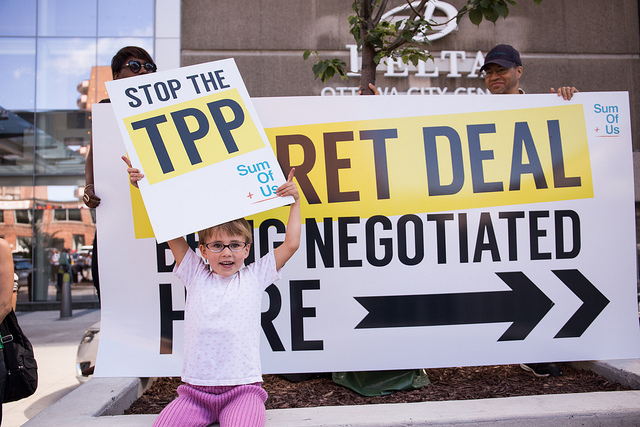Council of Canadians delivered 20,000 petitions against the Trans-Pacific Partnership trade deal to Parliament Hill.
“It’s difficult to imagine a world where Canada would turn its back on [the Trans-Pacific Partnership given it includes] three of its top five trading partners. We established very clearly during the campaign that we’re a pro-trade party,” said Prime Minister Justin Trudeau on Tuesday.
The Council of Canadians delivered the petition Wednesday to voice the objections of 20,000 people from across this country that can imagine a world where fair trade is prioritized over corporate rights agreements like the TPP.
Member of Parliament Tracey Ramsey accepted the two boxes of petitions at the doors that lead into the House of Commons. Ramsey represents the southern Ontario riding of Essex. She is the NDP trade critic, and is a member of the Standing Committee on International Trade.
“I have had lots of Canadians telling me they are worried about the TPP,” said Ramsey. “They are worried about their jobs, about impacts on environmental regulations, and about rising drug costs.”
The Trans-Pacific Partnership includes G7 “major advanced economies” such as the United States, Canada and Japan, G20 “major economies” which includes Australia and Mexico, as well as relatively smaller economies like New Zealand and Singapore and “developing economies” such as Brunei, Chile, Malaysia, Peru and Vietnam.
The TPP contains the investor-state dispute settlement (ISDS) mechanism. “It used to be the basic principle was polluter pay. If you damaged the environment, then you have to pay. Now if you pass a regulation that restricts ability to pollute or does something about climate change, you could be sued and could pay billions of dollars,” said Nobel Prize-winning economist Joseph Stiglitz.
It also includes a provision that extends patents for pharmaceutical corporations. In her comments on the TPP, Margaret Chan, the director-general of the World Health Organization said, “If these agreements open trade yet close the door to affordable medicines we have to ask the question: is this really progress at all.”
And in terms of economic consequences, a study by Tufts University found that the TPP would cost Canada 58,000 jobs and increase income inequality.
But our Prime Minister has commented, “In our conversations with Canadians, with industries which are ongoing, there are a lot of people in favour of it and there are a few who have real concerns and we’re looking at understanding and allaying certain fears and building on some of the opportunities.”
That’s not acceptable.
The Standing Committee on International Trade has set a deadline of Monday, Oct. 31 for public comment. It’s vital that they hear that Canadians are opposed to the TPP. To send your message to them and the Prime Minister, please click here.
Like this article? Please chip in to keep stories like these coming.
Flickr/SumOfUs



